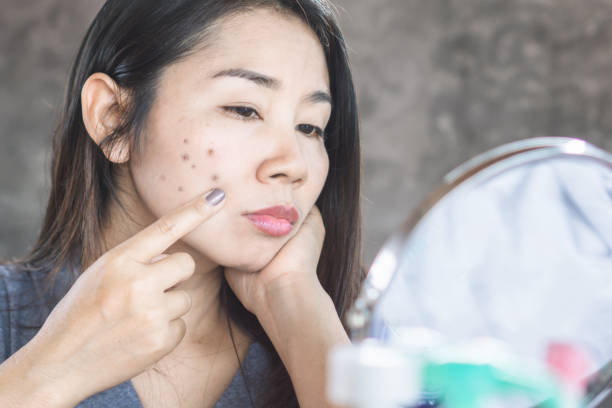Dark Spots on
Face

Dark spots on
the face, also known as hyperpigmentation, can be caused by a variety of
factors. Some common causes of dark spots on the face include:
- Sun
damage: Exposure to the sun’s harmful UV rays can cause hyperpigmentation
and dark spots on the face. - Hormonal
changes: Hormonal changes during pregnancy or menopause can cause dark
spots on the face. - Acne:
Inflammatory acne can cause dark spots on the face, especially if it is
not properly treated. - Aging: As
we age, our skin produces less collagen and elastin, leading to a loss of
elasticity and firmness, and dark spots may appear as a result. - Post-inflammatory
hyperpigmentation: This occurs when the skin produces too much pigment in
response to inflammation or injury, such as after a pimple or acne scar. - Genetics:
Some people may be more prone to developing dark spots on the face due to
genetic factors.
There are
several treatments available for dark spots on the face, including:
- Topical
treatments: Several OTC topical treatments contain ingredients like hydroquinone, kojic acid, vitamin C, or retinoids that
can help to fade dark spots over time. - Professional
treatments: A dermatologist can perform professional treatments like
chemical peels, microdermabrasion, or laser therapy to reduce the
appearance of dark spots. - Sun
protection: Wearing broad-spectrum sunscreen with an SPF of 30 or higher
every day can help to prevent further sun damage and hyperpigmentation.
- Lifestyle
changes: Making certain lifestyle changes, such as eating a healthy diet,
getting enough sleep, and reducing stress, can help to improve overall
skin health and reduce the likelihood of dark spots.
It’s important
to note that some treatments for dark spots can cause skin irritation or other
side effects, so it’s important to use them as directed and consult with a
dermatologist if you have any concerns.
Medical
treatments for dark spots
Several types of topical medicines can help to fade dark spots on the
face, including:
- Hydroquinone:
This is a common ingredient in many OTC and prescription creams for
hyperpigmentation. It works by inhibiting the enzyme responsible for
producing melanin, which can help to reduce the appearance of dark spots. - Kojic
acid: This is a natural ingredient that can help to lighten dark spots by
inhibiting the production of melanin. - Vitamin C:
This antioxidant can help to brighten the skin and reduce the appearance
of dark spots by inhibiting melanin production. - Retinoids:
These vitamin A derivatives can help to increase cell turnover and
stimulate collagen production, which can help to improve skin texture and
reduce the appearance of dark spots. - Azelaic
acid: This is a naturally occurring acid that can help to reduce the
production of melanin and improve overall skin tone.
It’s important
to note that while these topical medicines can be effective for treating dark
spots, they may not work for everyone, and they can cause skin irritation or
other side effects in some people. Additionally, it’s important to use these
medicines as directed and consult with a dermatologist if you have any
concerns. In some cases, a dermatologist may recommend professional treatments
like chemical peels or laser therapy to reduce the appearance of dark spots.
Precautions if
you have Dark spots on your face
There are
several precautions you can take to help prevent dark spots from forming or
getting worse:
- Wear
sunscreen: Sun exposure is a common cause of dark spots, so it’s important
to protect your skin by wearing broad-spectrum sunscreen with an SPF of
30 or higher every day. - Avoid
tanning beds: Tanning beds emit UV rays that can damage your skin and
increase the risk of hyperpigmentation and dark spots. - Treat acne
promptly: Acne can cause post-inflammatory hyperpigmentation, so it’s
important to treat acne promptly to prevent dark spots from forming. - Be gentle
with your skin: Avoid picking or scratching at your skin, which can cause
inflammation and hyperpigmentation. Also, be gentle when cleansing and
exfoliating your skin, as harsh scrubbing can cause irritation and make
dark spots worse. - Use
skin-lightening products with caution: While some skin-lightening products
can be effective for treating dark spots, they can also cause skin
irritation or other side effects in some people. Use these products as
directed and talk to your dermatologist if you have any concerns. - Seek
professional treatment: If you have severe or persistent dark spots, or if
they are causing you significant distress, consider seeking professional
treatment from a dermatologist who can recommend the best course of
treatment for your specific needs.
By following
these precautions and maintaining good skin care habits, you can help to
prevent and reduce the appearance of dark spots on your skin.




